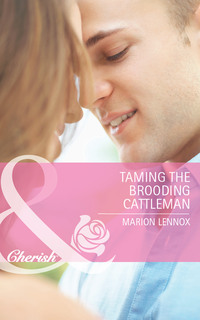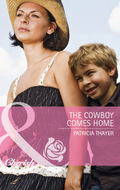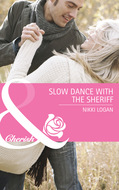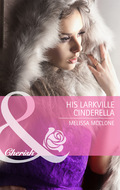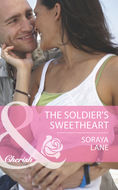Buch lesen: "The Larkville Legacy"

This Christmas, we’ve got some fabulous treats to give away! ENTER NOW for a chance to win £5000 by clicking the link below. www.millsandboon.co.uk/ebookxmas

THE LARKVILLE LEGACY
A secret letter… two families changed for ever
Welcome to the small town of Larkville, Texas, where the Calhoun family has been ranching for generations.
Meanwhile, in New York, the Patterson family rules America’s highest echelons of society.
Both families are totally unprepared for the news that they are linked by a shocking secret.
For hidden on the Calhoun ranch is a letter that’s been lying unopened and unread—until now!
Meet the two families in all eight books of this brand-new series:
THE COWBOY COMES HOME
by Patricia Thayer
SLOW DANCE WITH THE SHERIFF
by Nikki Logan
TAMING THE BROODING CATTLEMAN
by Marion Lennox
THE RANCHER’S UNEXPECTED FAMILY
by Myrna Mackenzie
HIS LARKVILLE CINDERELLA
by Melissa McClone
THE SECRET THAT CHANGED EVERYTHING
by Lucy Gordon
THE SOLDIER’S SWEETHEART
by Soraya Lane
THE BILLIONAIRE’S BABY SOS
by Susan Meier
“Now, let me inside the house, show me where I can eat and sleep, and get out of my life.”
She’d meant to stay icy. She’d meant to stay dignified. So much for intentions.
Her last words were almost hysterical—a yell into the silence. No matter. Who cared what he thought? She flicked the trunk lever and stalked round to fetch her suitcase. Her foot hit a rain-filled pothole, she tripped and lurched—and the arrogant toe-rag caught her and held her.
It was like being held in a vice. His hands held her with no room for argument. She was steadied, held still, propelled out of the puddle and set back.
His hands held her arms a moment longer, making sure she was stable.
She looked up, straight into his face.
She saw power, strength and anger. But more. She saw pure, raw beauty.
It was as much as she could do not to gasp.
Lean, harsh, aquiline. Heathcliff, she thought, and Mr Darcy, and every smouldering cattleman she’d ever lusted after in the movies all rolled into one. The strength of him. The sheer, raw sexiness.
He released her and she thought maybe she should lean against the car for a bit.
It was just as well this place was a total disaster; this job was a total disaster. Staying anywhere near this guy would do her head in.
About the Author
MARION LENNOX is a country girl, born on an Australian dairy farm. She moved on—mostly because the cows just weren’t interested in her stories! Married to a ‘very special doctor’, Marion writes for Mills & Boon® Medical Romance™ and Mills & Boon® Cherish™. (She used a different name for each category for a while—readers looking for her past romance titles should search for author Trisha David, as well). She’s now had more than seventy-five romance novels accepted for publication.
In her non-writing life Marion cares for kids, cats, dogs, chooks and goldfish. She travels, she fights her rampant garden (she’s losing) and her house dust (she’s lost). Having spun in circles for the first part of her life, she’s now stepped back from her ‘other’ career, which was teaching statistics at her local university. Finally she’s reprioritised her life, figured what’s important and discovered the joys of deep baths, romance and chocolate.
Preferably all at the same time!
Taming the
Brooding
Cattleman
Marion Lennox

MILLS & BOON
Before you start reading, why not sign up?
Thank you for downloading this Mills & Boon book. If you want to hear about exclusive discounts, special offers and competitions, sign up to our email newsletter today!
Or simply visit
Mills & Boon emails are completely free to receive and you can unsubscribe at any time via the link in any email we send you.
PROLOGUE
HE’D failed.
Jack Connor stood at his sister’s graveside and accepted how badly he’d broken his promise to his mother.
‘Take care of your sister.’
He’d been eight years old when his mother walked away. Sophie had been six.
What followed was a bleak, hard childhood, cramming schoolwork into his grandfather’s demands for farm labour, and caring for his sister in the times between. Finally he’d escaped his grandfather’s tyranny to the luxury of wages. From there he’d built a company from nothing. He’d had no choice. He’d been desperate for funds to provide the professional care Sophie so desperately needed.
It hadn’t worked. Even though he’d made money, the care had come too late. For all that time he’d watched his sister self-destruct.
Sophie’s social worker had come to the funeral. Nice of her. Her presence meant there’d been a whole three people in attendance. She’d looked into his grim face and she’d tried to ease his pain.
‘This was not your fault, Jack. Your mother wounded your sister when she walked out, but the ultimate responsibility was Sophie’s.’
But he stared down at the grave and knew she was wrong. Sophie was dead and the ultimate responsibility was Jack’s. He hadn’t been enough.
What now?
Return to Sydney, to his IT company, to riches that had bought him nothing?
He stared down at the rain-soaked roses he’d laid on his sister’s grave, and a memory wafted back. Sophie at his grandfather’s farm, on one of the occasions his grandfather had been so blind drunk they weren’t afraid of him. Sophie in what was left of his grandmother’s rose garden. Sophie pressing roses into storybooks. ‘We’ll keep them for ever.’
Suddenly he found himself thinking of horses he hadn’t seen for years. His grandfather’s horses, his friends from childhood. They’d asked for nothing but food, shelter and exercise. When he’d been with the horses, he’d almost been happy.
The farm was his now. His grandfather had died a year ago, but the demands of Sophie’s increased illness meant he hadn’t had time to go there. He guessed it’d be rundown. Even the brief legal contact he’d made had him sensing the manager his grandfather had employed was less than honest, but the bloodlines of his grandfather’s stockhorses should still be intact. Remnants of the farm’s awesome reputation remained.
Could he bring it back to its former glory?
Decision time.
He stared down at the rain-washed grave, his thoughts bleak as death.
If he was his grandfather, he thought, he’d hit something. Someone.
He wasn’t his grandfather.
But he didn’t want to return to Sydney, to a staff who treated him as he treated them, with remote courtesy.
The company would keep going without him.
He stood and he stared at his sister’s grave for a long, long time.
What?
He could go back to the farm, he thought. He still knew about horses.
Did he know enough?
Did it matter? Maybe not.
Decision made.
Maybe he’d make a go of it. Maybe he wouldn’t, but he’d do it alone and he wouldn’t care.
Sophie was dead and he never had to care again.
CHAPTER ONE
ALEX Patterson was having doubts. Serious doubts.
On paper the journey had sounded okay. Manhattan to L.A. L.A. to Sydney. Sydney to Albury. Albury to Werarra.
Yeah, well, maybe it hadn’t sounded okay, but she’d read it fast and she hadn’t thought about it. A few hours before she’d reached Sydney she was tired. Now, after three hours driving through pelting rain, she was just plain wrecked. She wanted a long, hot bath, a long, deep sleep and nothing more.
Surely Jack Connor wouldn’t expect her to start work until Monday, she thought. And where was this place?
The child she’d seen on the road a way back had told her it was just around the bend. The boy had looked scrawny, underfed, neglected, and she’d looked at him and her doubts had magnified. She’d expected a wealthy neighbourhood—horse studs making serious money. The child looked destitute.
Werarra Stud must be better. Surely it was. Its stockhorses were known throughout the world. The website showed a long, gracious homestead in the lush heart of Australia’s Snowy Mountains. She’d imagined huge bedrooms, gracious furnishings, a job her friends would envy.
‘Werarra.’ She saw the sign. She turned into the driveway—and she hit the brakes.
Uh-oh.
That was pretty much all she was capable of thinking. Uh-oh, uh-oh, uh-oh.
The website showed an historic photograph of a fabulous homestead built early last century. It might have been fabulous then, but it wasn’t fabulous now.
No one had painted it for years. No one had fixed the roof, mended sagging veranda posts, done anything but board up windows as they broke.
It looked totally, absolutely derelict.
The cottage the child had come from had looked bad. This looked worse.
There was a light on somewhere round the back. A black SUV was parked to the side. There was no other sign of life.
It was pouring. She was so tired she wasn’t seeing straight. It was thirty miles back to the nearest town and she wasn’t all that sure Wombat Siding was big enough to provide a hotel.
She stared at the house in horror, and then she let her head droop onto the steering wheel.
She would not weep.
A thump on her driver’s side window made her jump almost into the middle of next week.
Oh, my …
She needed to get a grip. Now.
You can cope with this, Alex Patterson, she told herself. You’ve told everyone back home you’re tough, so prove it. You’re not the spoilt baby everyone treats you as.
But this was … this was …
Another thump. She raised her head and looked out.
The figure outside the car was looming over the car window like a great black spectre. Rain-soaked and vast, it was blocking her entire door.
She squeaked. Maybe she even gibbered.
Then the figure moved back a bit from the car window, letting light in, and she came back to earth.
A man. A great, warrior-size guy. He was wearing a huge, black, waterproof coat, and vast boots.
The guy’s face was dark, his thick black hair slicked to his forehead in the rain. He had weather-worn skin, stubble so thick it was close to a beard, and dark, brooding eyes spaced wide and deep.
He was waiting for her to open the car door.
If she opened it, she’d get wet.
If she opened it, she’d have to face what was outside.
He opened it for her, with a force that made her gasp. The rain lashed in and she cringed.
‘You’re lost?’ The guy’s voice was deep and growly, but not unfriendly. ‘You need directions?’
If only she was, she thought. If only …
‘Mr. Connor?’ she managed, trying not to stutter. ‘Jack Connor?’
‘Yes?’ There was sudden incredulity in his voice, as if he didn’t believe what he was hearing.
‘I’m Alex Patterson,’ she told him. ‘Your new vet.’
There were silences and silences in Alex’s life. The silences as her mother disapproved—as she inevitably did—of what Alex was wearing, what she was doing. The silences after her father and brother’s fights. Family conflicts meant Alex had been brought up with silences. It didn’t mean she was used to them.
She’d come all the way to Australia to escape some of those silences, yet here she was, facing the daddy of them all.
This was like the silence between lightning and thunder—one look at this man’s face and she knew the thunder was on its way.
When finally he spoke, though, his voice was icy calm.
‘Alexander Patterson.’
‘Yes.’ Don’t sound defensive, she thought. What was this guy’s problem?
‘Alex Patterson, son of Cedric Patterson, Cedric, the guy who went to school with my grandfather.’
She put a silence of her own in here.
Son of …
Okay, she saw the problem.
She’d trusted her father.
She thought of her mother’s words. ‘Alex, your father is ill. You need to double-check everything….’
‘Dad’s okay. You’re dramatising. There’s nothing wrong with him.’ She’d yelled it back at her mother, but even as she’d yelled it, she knew she was denying what was real. Alzheimer’s was a vast, black hole, sucking her dad right in.
She hadn’t wanted to believe it. She still didn’t.
She’d trusted her father.
And anyway, what was the big deal? Man, woman, whatever. She was here as a vet. ‘You thought I was male?’ she managed, and watched the face before her grow even darker.
‘I was told you were a guy. His son.’
‘That’s my dad for you,’ she said, striving for lightness. ‘A son is what he hoped for, but you’d think after twenty-five years he could figure the difference.’ Deep breath. ‘Do you think you could, I don’t know, invite me in or something? I hate to mention it when the fact that I’m female seems to be such an issue, but an even bigger deal is that it’s raining, I’m not wearing waterproofs and it’s wet.’
‘You can’t stay here.’
This was bad, she thought, and it was getting worse.
But her dad’s fault or not, this was a situation she had to face, and she might as well face it now.
‘Well, maybe you should have told me that before I left New York,’ she snapped, and she hauled herself out of the car. She was already wet. She might as well be soaked, and her temper, volatile at the best of times, was heading for the stratosphere. ‘Maybe now I don’t have a choice.’
Deep breath, she thought. Say it like it is.
‘I,’ she said, in tones that matched his for iciness and more, ‘am at the end of a very long rope that stretches all the way back to New York. It’s taken me three days to get here, give or take a day that seems to have disappeared in the process. I applied for a job here in good faith. I sent every piece of documentation you demanded. I accepted a work visa for six months on the strength of a job with a horse stud that looks—’ she glanced witheringly at the house ‘—to be non-existent. And now you have the nerve to tell me you don’t want me. I don’t want you either, but I seem to be stuck with you, with this dump, with this place, at least until the rain stops and I’ve eaten and I’ve slept for twenty-four hours. Then, believe me, you won’t see me for dust. Or mud. Now let me inside the house, show me where I can eat and sleep, and get out of my life.’
She’d meant to stay icy. She’d meant to stay dignified. So much for intentions.
Her last words were almost hysterical—a yell into the silence. No matter. Who cared what he thought? She flicked the trunk lever and stalked round to fetch her suitcase. Her foot hit a rain-filled pothole, she tripped and lurched—and the arrogant toerag caught her and held her.
It was like being held in a vice. His hands held her with no room for argument. She was steadied, held still, propelled out of the puddle and set back.
His hands held her arms a moment longer, making sure she was stable.
She looked up, straight into his face.
She saw power, strength and anger. But more.
She saw pure, raw beauty.
It was as much as she could do not to gasp.
Lean, harsh, aquiline. Heathcliff, she thought, and Mr Darcy, and every smouldering cattleman she’d ever lusted after in the movies, all rolled into one. The strength of him. The sheer, raw sexiness.
He released her and she thought maybe she should lean against the car for a bit.
It was just as well this place was a total disaster; this job was a total disaster. Staying anywhere near this guy would do her head in.
Her head was already done in. She was close to swaying.
Focus on your anger, she told herself. And practicalities. Get your gear out of the car. He’s going to think you’re a real New York princess if you expect him to do it for you.
But he was already doing it, grabbing her cute, pink suitcase (gift from her mother), glancing at it with loathing, slamming the trunk closed and turning to march toward the house.
‘Park the car when it stops raining,’ he snapped over his shoulder. ‘It’ll be fine where it is for the night.’
She was supposed to follow him? Into the Addams Family nightmare?
A flash of lightning lit the sky and she thought it needed only that.
Thunder boomed after it.
Jack had reached the rickety steps and was striding up to the veranda without looking back.
He had her suitcase.
She whimpered. There was no help for it, she whimpered.
Her family thought she was a helpless baby. If they could see her now, they’d be proven right. That’s exactly how she felt. She wanted, more than anything, to be back in Manhattan, lying in her gorgeous peach bedroom, with Maria about to bring her hot chocolate.
Where was her maid when she needed her most? Half a world away.
More lightning. Oh, my …
Jack was disappearing round the side of the veranda. Her suitcase was disappearing with him.
She had no choice. She took a deep breath and scuttled after him.
He showed her to the bedroom and left her to it. Headed to his makeshift study and hauled open his computer. Grabbed the original letter.
Could he sack a worker just because she was female?
Surely he could if she’d taken the job under false pretences, he thought, reading the first letter he’d received.
My son, Alexander, is looking for experience on an Australian horse stud. Alex is a qualified veterinarian and is also willing to take on general farm work. The level of pay would not be a problem; what Alex mostly wants is experience.
My son.
He flicked through the emails, printing them out. After Cedric’s first letter he’d corresponded directly with Alex. Her. There was no mention of what sex she was in her emails, he conceded. They’d been polite, businesslike, and they hadn’t referred to her sex at all.
Yes, I understand the living conditions may be rougher than I’m accustomed to, but I’d appreciate even a tough job. My aim is to work on horse studs in the States, but getting that first job after vet school is difficult. If I do a decent job for you, it may well give me the edge over other graduates.
He’d expected a fresh-faced kid straight out of vet school, possibly not understanding just how tough it was out here, but ready to make a few sacrifices in order to get the job. Despite the conditions, Werarra produced horses with an international reputation. This would be a good career step.
He’d never have employed a woman.
He hadn’t wanted to employ anyone, but sense had decreed he had no choice. This place had deteriorated to the point of being a ruin. The horses took all his attention. The house was derelict and the manager’s cottage even more so. Brian, the guy who’d managed the place for his grandfather, preferred to live a half a mile down the road on the second of the farm’s holdings. Jack had expected him to keep on working, but the moment Jack arrived he’d lit out, abandoning his wife and kids, disappearing without trace.
The letter from Cedric Patterson, addressed to Jack Connor, had come when he was overwhelmed. Despite his misgivings he’d thought, a vet … plus someone who could help with the heavy manual work like getting the fences back in order … The manager’s house was unlivable, but maybe a kid could cope with sharing the big house with him.
He’d written back to Cedric explaining that the Jack he was writing to, the Jack he’d gone to school with, was dead. Cedric had visited Werarra, had stayed here, when he and his grandfather were young men, when his grandmother was alive and making the place a home. The house had deteriorated, he’d told him. There were no separate living quarters, but if Alex was happy to do it tough …
Alex himself … herself … had emailed back saying tough was fine.
What now? He didn’t even have a working bathroom. Asking a guy to use the outhouse was a stretch, but a woman?
He could fix the bathroom. Maybe. But not tonight.
And he still didn’t want a woman. The women in his life had caused him nothing but grief and anguish. To have another, sharing his house, sharing his life …
Stop it with the dramatisation, he told himself harshly. She wouldn’t want to stay even if he wanted her to. She obviously had a romantic view of what an outback Australian horse stud would be. One look at the outside privy and she’d run.
He didn’t blame her.
Meanwhile …
Meanwhile he needed to feed her. He hurled sausages into the pan, sliced onions as if he could get rid of his anger on the chopping board, tossed them on top of the sausages and fumed. At himself more than her. He shouldn’t have tried to employ anyone until he had this place decent, but a woman?
She took one look at the outside privy and wanted to die.
There was an inside bathroom, but … ‘Plumbing’s blocked,’ Jack had said curtly, as he showed her her bedroom. ‘Tree roots. Use the outhouse. There’s a torch.’
The outhouse was fifty yards from the back door. A massive, overgrown rose almost hid it from view, and she had to make her way through a tunnel of vine to reach it.
A couple of hefty beef cattle were hanging their heads over the fence, dripping water in the rain, looking at her as if she was an alien.
That’s how she felt. Alien.
She locked the outhouse door, and something scrabbled over the outhouse’s tin roof. What?
She wanted to go home.
‘You’re a big girl,’ she told herself, out loud so whatever it was on the roof would get the picture. ‘You need to get in there, front Jack Sexist Connor, find something to eat, get some sleep and then find a way out of this mess.’
The rain had eased for a minute, which was why she’d taken the chance and run out here. It started again, sheeting in under the door.
‘I want to go home,’ she wailed, and the thing on the roof stilled and listened.
And didn’t answer.
He was cooking sausages. Eight fat sausages, Wombat Siding butcher’s finest. He cooked mashed potato and boiled up some frozen peas to go with them.
He set the table with two knives, two forks, a ketchup bottle and two mugs. What more could a man want?
A woman might want more, he conceded, but she wasn’t getting more.
What did he know about what a woman would want? A woman who was supposed to be a man.
She pushed open the door, and his thoughts stopped dead.
She’d been wearing black pants and a tailored wool jacket when she arrived. Her hair had been twisted into a knot. She’d been wearing red ankle boots, with old-fashioned buttons. She’d looked straight out of New York.
Now …
He’d left a pitcher and basin in her bedroom and she’d obviously made use of it. She’d washed—the tendrils of blond curls around her face were damp—and her face was shiny clean with no hint of make-up. She was wearing jeans and an oversize sweater. Her curls hung free to her shoulders.
She was wearing thick, pink socks.
The résumé she’d sent said she was twenty-five years old. Right now she looked about sixteen. Pretty. Really pretty. Also … scared?
Daniel in the lion’s den.
Or woman in Werarra.
Same thing, only he wasn’t a lion. But she couldn’t stay here.
‘Sit down and wrap yourself round something to eat,’ he said roughly, trying to hold to anger.
‘Thank you.’ She sidled into a chair on the far side of the table to him, still looking scared.
‘Three sausages?’
‘One.’
‘Suit yourself.’ He put one sausage onto a chipped plate, added a pile of mash and a heap of peas and put it in front of her. He ladled himself more.
He sat and started eating.
She sat and stared at her plate.
‘What?’ he said.
‘I didn’t lie,’ she said in a small voice.
‘I have the documentation,’ he said, pointing to the pile of papers he’d left on the end of the table. ‘My son. That would be a male.’
‘Nothing in any of my emails to you said I was a guy.’
‘They didn’t have to. I already knew. Your father’s letter. The visa application. My son, the letter said. Plus Alexander. It’s a guy’s name.’
‘Yes,’ she said, and shoved her plate back. ‘It is.’
‘So?’
‘My father doesn’t get on with my older brother.’ She was speaking calmly, in a strangely dull voice, like she’d reached some point and gone past. ‘I’ve never figured why, but there’s nothing anyone can do to fix it. I have two older sisters, and by the time I arrived Dad was desperate for a male heir other than Matt. He was sure I’d be the longed-for son. He planned on calling me Alexander, after his dad, only of course I ended up being Alexandra. So Dad filled in the birth certificate. Maybe he’d had a few drinks. Maybe it was just a slip, or maybe it was anger that I wasn’t what he wanted. I don’t know, but officially I’m Alexander. My family calls me Alexandra but on official stuff, I need to use Dad’s spelling.’ She tilted her chin and tried to glare at him. ‘So … does it matter?’
‘Yes,’ he said flatly. ‘It does. Your father said you were his son. I want to know why he lied.’
‘He made a mistake.’
‘Fathers don’t make that sort of mistake.’
‘They do if they always wanted their daughter to be a boy,’ she said dully. She closed her eyes and clenched her fists. ‘They do if they have Alzheimer’s.’
Silence.
Whatever he’d expected, it wasn’t that. The word hung. She hadn’t wanted to say it, he thought. Admitting your dad was ill … It hurt, he thought. It hurt a lot.
Anger faded. He felt … cruel. Like he’d damaged something.
‘So why does it matter?’ she demanded, hauling herself together with a visible effort. ‘What have you got against women?’
‘Nothing.’
‘I applied for jobs after graduating,’ she said. ‘I want horse work. To work with horses, not ponies, not pets. You try and get a job on a horse ranch when you’re twenty-five and blonde and cute.’
And she said the word cute with such loathing he almost smiled.
‘I can imagine …’
‘No, you can’t,’ she snapped. ‘You’re six feet tall, built like a tank and you’re male. You know nothing at all about what it’s like to want to handle yourself with horses. This job … six months at Werarra Stud … is supposed to give me credibility with the ranchers back home, but you’re just the same as every redneck cowboy know-all who ever told me I can’t do it because I’m a girl.’
‘So you’re prepared to put up with an outhouse for six months?’ he demanded, bemused.
‘Not if it comes with an arrogant, chauvinistic oaf of an employer. And not if I have to eat grease.’ And she shoved her plate across the table at him with force.
He caught it. He piled the sausage and mash absently onto his plate. He thought cute was a really good description.
Don’t go there. This was a mistake he had to get rid of. He did not want to think any woman was cute.
‘So you’ll go home tomorrow,’ he said, and she looked around and he thought if she had another plateful she might just possibly throw it at him.
‘Why should I? I didn’t lie about this job. You did.’
‘I didn’t.’
‘Liar.’
‘I told you it’d be rough.’
‘I assumed you meant no shops. Living in the outback. The house … On the website it looks gorgeous.’
‘That picture was taken eighty years ago. Romantic old homestead.’
‘It’s false advertising.’
‘I’m not advertising my house,’ he said evenly. ‘I’m advertising my horses. I wanted the website to show a sense of history, that Werarra workhorses are part of what this country is.’
‘Show the picture of your outhouse, then,’ she snapped. ‘Very historic.’
‘You’ll starve if you don’t eat.’
‘I couldn’t eat sausages if you paid me.’
‘Don’t tell me—you’re vegan.’
‘I’m not.’
‘Then why …’
‘Because I’ve travelled for three days straight,’ she snapped. ‘Because I’m jet-lagged and overtired and overwrought. Because if you must know, my stomach is tied in knots and I’d like a dainty cucumber sandwich and a cup of weak tea with honey. Not a half-ton of grease. But if I have to go to bed with nothing, I will.’ She shoved back her chair and stood. ‘Good night.’
‘Alex …’
‘What?’ she snapped.
‘Sit down.’
‘I don’t want—’
‘You don’t want sausages,’ he said and sighed, and opened the oven door of the great, old-fashioned fire stove that took up half the kitchen wall. He shoved his plate in there. ‘I’ll keep mine hot while I make you something you can eat.’
‘Cucumber sandwiches?’
He had to smile. She sounded almost hopeful.
‘Nope,’ he said. ‘I clean forgot cucumber on my shopping list. But sit down, shut up, and we’ll see if we can find an alternative.’
She sat.
She looked up at him, half distrustful, half hopeful, and he felt something inside him twist.
Sophie, bleak as death, stirring her food with disinterest. ‘I can’t eat, Jack….’
Sophie.
Do not think this woman is cute. Do not think this woman is anything other than a mistake you need to get rid of.
But for tonight … Yeah, she was needy. The explanation for the mix-up … it had hurt her to tell him about her dad; he could see that it hurt. And she was right, it shouldn’t matter that she was a woman.
It wasn’t her fault that it did. That the thought of a woman sitting on the far side of the table, a woman who even looked a little like Sophie, stirred something inside him that hurt. A lot.
She wasn’t saying anything. He poured boiling water over a tea bag, and ladled in honey. He handed her the mug and watched her cradle it as if she needed its comfort.
The stove was putting out gentle warmth. This room was the only place in the house that bore the least semblance to cosy.
She didn’t look cosy. She looked way out of her depth.
He was being cruel. If she was leaving in the morning, it wouldn’t hurt to look after her.
He eyed her silently for a moment while she cradled her mug and stared at the battered wood of the ancient kitchen table.
Die kostenlose Leseprobe ist beendet.
